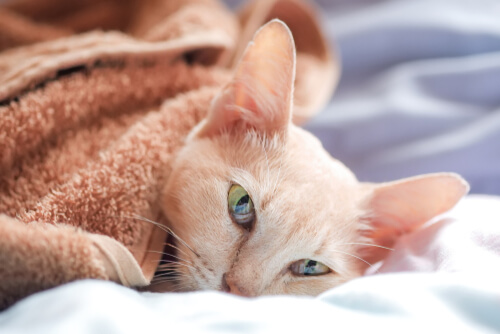However in many cases treating the underlying cause of feline seizures may not be possible.
Epileptic cat treatment.
Ideally this underlying condition can be diagnosed and treated leading to resolution of the seizures.
If no specific underlying cause of the epilepsy can be identified the cat is diagnosed with idiopathic epilepsy and general anti seizure medication may be needed to attain seizure control.
The treatment for epileptic seizures does not aim to cure the epilepsy but aims to control it.
Drug dosages may need to be adjusted depending on drug serum levels and response to treatment.
A seizure is a sudden surge in the electrical activity of the brain causing signs such as twitching shaking tremors convulsions and or spasms.
Approximately 75 of cats presented for epilepsy have an underlying cause for their seizures.
The type of treatment depends on the type of epilepsy.
There are generally two types of epileptic seizures in cats.
Seizures can also occur in a cat who does not have epilepsy but is rather the result of other causes.
When this disease is diagnosed in your cat you need to make sure that its environment and surroundings are calm.
Older cats that are on potassium bromide treatment will need to be carefully monitored for kidney insufficiency.
Epileptic seizures are often the result of neurotransmitters in a part of the brain firing uncontrollably.
It is a more common disorder than you d think which makes it difficult for the party suffering from it to lead a normal life because they may suffer an epileptic seizure at any point.
Epilepsy is used to describe repeated episodes of seizures.
A treatment is usually considered successful if the cat is seizure free or the frequency of seizures has been reduced by at least 50 and no or minimal side effects of the medication are observed.
Grand mal and petit mal.
Epilepsy is a neurological disease that affects many different animals including human beings.
If a cat has idiopathic epilepsy or is not responding to treatment of the underlying disease antiepileptic medications may be considered.
Your cat may also suffer from idiopathic epilepsy meaning all known causes for seizures have been eliminated.
Your cat may suffer from a disease or condition for which treatment is not possible or practical.
If you have an older cat that will be undergoing treatment for epileptic seizures your veterinarian may recommend a diet change for the cat.
Unfortunately many of the anti seizure medications used to treat epilepsy in dogs are toxic to cats and treatment options are limited as a result.

